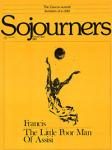This article originally appeared in the December 1981 issue of Sojourners. To subscribe, click here.
If ever the 20th century has been given a key to the secret of wisdom in a crazy world, it is in Francis. But so distorted are our values, so limited our vision, so self-centered our society that it's Francis who comes out looking mad.
His own society, even his own father, thought he'd lost his mind.
But our society is not much for loving lunacy either. We romanticize it perhaps, but we certainly do not promote it. As a youngster in the local Catholic school, I learned that Francis gave up a high position in the army and the family business to live with the poor. Frankly, I questioned that, too. I never told Sister, of course. Saints were saints, after all, and not to be criticized. But I had already learned from subtler sources that the purpose of life was to get ahead, to buy things, to be patriotic, to be independent and proper and strong. Now I'm beginning to understand, I think: While we're all talking wisdom in this wasted, wacky, warring world, Francis of Assisi is a key to understanding it that nobody wants.
Ronald Reagan went to Cancun to give the starving countries of the world the 19th-century American industrial answer: If you work hard enough you, too, can be rich. That's no Francis of Assisi speaking. Francis would give things away. In abundance. That's a key apparently that nobody in their right minds considers sensible.
Alexander Haig went to Europe to convince the Western allies that the politics of terror were benign. That wasn't Francis of Assisi speaking. Francis would take off his sword, give away his cloak, do good to his enemy. Without limits. That's a key you can't even give away.
The U.N. Report on Women says that though 50 per cent of the world's population is women, two-thirds of the hungry of the world are women, three-fourths of the illiterate of the world are women, and less than 10 per cent of the world's income is owned by women though they provide 66 per cent of the world's work hours. Obviously, some people are more valuable than others; except to Francis who talked to animals, sang to nature, elevated every living thing as equal, as beautiful, as good. No culture of control for him. But that key would turn the world aspin.
Yes, we need Francis of Assisi in the 20th century, but we need him off the holy cards, out of the churches into the streets, out of the litanies into the legislatures.
Dorothy Day said once, "Don't call me a saint. I have no intention of letting you dismiss me that easily." Dorothy had a point.
We need Francis badly, but you can't help but wonder if he'd be accepted now. He was so deeply embedded in the gospel that he was out of step with everything else, and that was enough for him. He spent his life gearing down instead of moving up, a most un-American thing. He was foolish enough to be happy with nothing and promote it for others. In a macho, medieval world he was the radiant embodiment of the feminine. He was soft, and caring and loving and unashamed.
But this world still derides all of that, to its own peril.
Someone said to me, "Why are you writing about St. Francis? You're a Benedictine." I thought first of the continuing historical association between Benedictines and Franciscans, but realized that's really not enough of an answer. The truth is that I want with all my heart to have the wisdom to be a real woman and a real Christian. Somehow, in this world, I'm convinced that Francis of Assisi is still a key to all of that.
Joan Chittister, O.S.B., was prioress of the Benedictine Sisters of Erie and a contributing editor for Sojourners when this article appeared.

Got something to say about what you're reading? We value your feedback!
